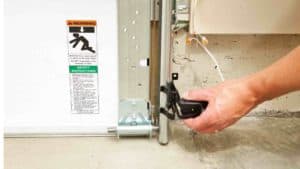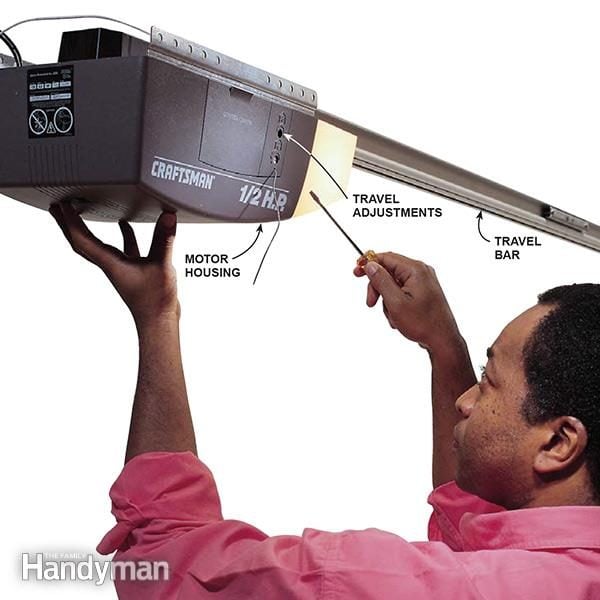Imagine this: You’re in a rush to get to work or pick up your kids, and suddenly, your garage door won’t close all the way. Frustrating, right?
We’ve all been there, and it’s a situation that can leave you feeling stuck and anxious. You rely on your garage door for security, convenience, and peace of mind. When it doesn’t work properly, it can disrupt your entire day.
But don’t worry! This article will guide you through simple solutions and tips to ensure your garage door closes smoothly every time. By addressing the common causes, you’ll gain control over the situation and restore your garage door’s functionality. Keep reading to discover how you can fix this problem quickly and get back to your routine without hassle.
Common Causes
Having trouble with your garage door not closing all the way can be frustrating. Understanding the common causes can save you time and stress. Knowing where to look can help you fix the issue quickly and efficiently.
Sensor Issues
Sensors are crucial for the safe operation of your garage door. If your door won’t close completely, check if the sensors are misaligned. Imagine this: you’re rushing to leave, and your garage door refuses to budge because the sensors aren’t facing each other properly. A simple adjustment can solve this. Also, clean any dirt or debris off the sensors, as this can prevent them from working correctly.
Track Obstructions
The tracks guide your garage door smoothly up and down. Even small obstructions can stop the door from closing fully. Picture a tiny pebble or toy blocking the track, causing a big headache. Regularly inspect the tracks and clear any debris. This simple step can ensure your garage door glides effortlessly.
Remote Control Malfunctions
The remote control is your key to convenience. However, technical issues can arise, making your garage door stubbornly stay open. Test the batteries—are they dead or dying? Replacing them might be all you need. If your remote is still unresponsive, consider reprogramming it. What if your remote is experiencing interference? Try reducing nearby electronic signals to improve performance.
These common causes can be easily addressed. By taking proactive steps, you can keep your garage door operating smoothly. The next time your garage door acts up, you’ll know exactly where to start looking for the fix. Why let a minor issue disrupt your day when a quick solution could be at hand?

Credit: www.garagedoorrepair.com
Safety Sensor Adjustments
Is your garage door refusing to close fully? Safety sensor issues might be the culprit. These sensors play a crucial role in ensuring your garage door operates safely. Proper adjustments can resolve many common problems. Dive into aligning and cleaning your garage door sensors.
Aligning The Sensors
Misaligned sensors can prevent your garage door from closing. Start by checking their alignment. Both sensors must face each other directly. Use a level to ensure they are not tilted. Adjust their position on the brackets if needed. Tighten the screws to secure them. Test the door to see if it closes completely.
Cleaning Sensor Lenses
Dirty sensor lenses can disrupt their function. Dust and debris often accumulate on the lenses. Use a soft cloth to clean them gently. Avoid using harsh chemicals. Regular cleaning keeps the sensors functioning properly. Clean both sensors for best results. Ensure they are free from obstructions.
Track And Roller Maintenance
Garage door issues often arise from neglected track and roller maintenance. Dirt and rust can block smooth operation. Regular cleaning and lubrication help ensure your garage door closes completely.
Garage doors often experience issues closing completely. Track and roller maintenance can solve these problems. Keeping these parts in top shape ensures smooth operation. Proper maintenance extends the life of your garage door.Clearing Debris
Debris in the tracks can stop the garage door. Look for dirt, leaves, and small objects. These can block the path of the rollers. Use a damp cloth to wipe the tracks. Remove all visible dirt and grime. Check both sides of the track. Ensure the path is clear for smooth movement.Lubricating Moving Parts
Lubrication is key for smooth garage door function. Use a silicone-based lubricant for best results. Apply to the rollers and hinges. Avoid using grease as it attracts more dirt. Move the door up and down. This spreads the lubricant evenly. Repeat this process every few months. Proper lubrication prevents wear and tear. It also reduces noise during operation.Remote Control Troubleshooting
Experiencing issues with your garage door not closing completely? The remote control might be the culprit. Addressing remote control problems can resolve the issue swiftly. Let’s delve into troubleshooting steps for your remote control.
Battery Replacement
Check the remote control batteries first. Old batteries often lose power, affecting signal transmission. Replace them regularly to maintain functionality. Ensure the battery compartment is clean and free from corrosion. A fresh set of batteries can make a significant difference.
Signal Interference
Signal interference might cause your garage door to malfunction. Other devices in your home can block the remote signal. Wireless routers and phones are common culprits. Try moving these devices away from the garage area. This simple step can improve signal clarity.
Ensuring your remote works properly is vital for a smooth garage door operation. With these troubleshooting tips, you can address common remote control issues effectively.
Force Setting Adjustments
Experiencing issues with garage doors? Adjusting the force settings might help. These settings ensure the door closes completely, providing safety and security. Proper adjustments prevent unwanted gaps, enhancing efficiency and reliability.
When your garage door refuses to close all the way, it can be frustrating. Often, the culprit lies in the force settings of your garage door opener. These settings control how much power is applied to open and close the door. If not adjusted properly, they can prevent your door from closing completely. Understanding how to tweak these settings can save you from an unnecessary call to a technician and get your garage door back on track.Testing Force Settings
Start by testing the force settings of your garage door opener. This involves observing how the door behaves when it’s closing. Does it stop or reverse before hitting the ground? This could indicate that the force setting is too low. To test, hold the door as it closes. If it stops or reverses too easily, the force is insufficient. You should be able to stop the door with moderate force. This test helps determine if an adjustment is necessary.Adjusting Limits
Next, adjust the limits of the garage door opener. These limits tell the motor when to stop running. If they are set incorrectly, the door might not close fully. Locate the limit adjustment screws on your opener. They are usually labeled, making them easy to find. Turn the screw that controls the closing limit. Adjust it gradually, testing the door each time until it closes completely. Have you ever had to adjust these settings before? Share your experience in the comments. This not only helps you but also others facing similar issues. Adjusting force settings and limits can seem daunting at first. But with patience and a bit of trial and error, you can have your garage door functioning smoothly. Is there a better feeling than solving a household problem on your own?
Credit: www.familyhandyman.com
Spring And Cable Inspection
Is your garage door stopping short of closing? Inspecting the springs and cables might reveal the issue. Regular checks can prevent malfunctions and ensure smooth operation.
Your garage door is a crucial part of your home’s security and convenience. When it won’t close all the way, it can be frustrating and concerning. One common culprit behind this issue is faulty springs and cables. Regularly inspecting these components can save you from potential headaches and costly repairs.Checking For Damage
Start by visually examining the springs and cables. Look for signs of wear such as rust, fraying, or visible breaks. A worn-out spring or damaged cable can prevent your garage door from closing properly. Listen for unusual noises. If you hear squeaking or grinding, your springs or cables might be under stress. This is often a sign that they need attention. Don’t forget to check for alignment issues. Misaligned cables or springs can cause the door to stop short of closing completely. Ensure everything is in its proper place.Replacing Worn Components
If you identify any damage, replacing the worn components is crucial. New springs and cables can restore your door’s functionality. Ensure you select the right type and size for your specific garage door model. You might consider hiring a professional. Replacing springs and cables can be dangerous if you’re not familiar with the process. Professionals have the right tools and expertise to do it safely. Keep track of your garage door’s performance after replacement. If it still doesn’t close all the way, there may be another underlying issue. Regular maintenance checks can help you catch problems early. Have you ever experienced a garage door issue that turned out to be a simple fix? Share your story in the comments! Your experience could help others dealing with similar issues.Professional Assistance
When your garage door refuses to close all the way, it can be a frustrating and potentially risky situation. While some issues might be minor and easily fixable, others require professional assistance. Knowing when to call a technician can save you time, money, and stress. Plus, understanding repair costs upfront helps you make informed decisions.
When To Call A Technician
There are moments when DIY fixes just won’t cut it. If your garage door is stuck halfway, or if it’s making strange noises, it might be time to call in the pros. What if the door reverses before touching the ground? This could be a sign of sensor misalignment or a wiring issue that a technician can resolve efficiently.
Think about safety too. A malfunctioning garage door can pose risks to you and your family. If you’re unsure about the root cause of the problem, don’t hesitate to reach out to a technician. They have the expertise to handle complex issues and ensure your door is safe to operate.
Evaluating Repair Costs
Understanding repair costs is crucial before you decide on professional help. Ask for a detailed estimate from your technician. This helps you gauge if the repair is worth the investment or if a replacement might be more cost-effective.
Consider the age of your garage door. If it’s older, frequent repairs might add up quickly. But if it’s relatively new, a one-time fix could be more economical. Weigh the pros and cons of repair versus replacement carefully.
Are you wondering if the cost is justified? Think about the convenience and security a fully functional garage door offers. Investing in repairs not only ensures smooth operation but also adds to the overall value of your home.

Credit: diy.stackexchange.com
Frequently Asked Questions
Why Won’t My Garage Door Close Completely?
The safety sensors might be misaligned. Check if they’re blocked or need realignment.
How Do I Fix A Garage Door That Won’t Close?
Inspect the tracks for obstructions. Clear debris. Ensure tracks are aligned properly.
Can Weather Affect My Garage Door Closing?
Yes, cold weather can cause metal parts to contract. This might affect door operation.
Is There An Issue With The Garage Door Remote?
Check the battery. Sometimes, a weak battery can prevent the door from closing.
What Should I Do If Sensors Are Clean But Door Won’t Close?
Check sensor alignment. Ensure wiring is intact. Consider calling a professional if issues persist.
Conclusion
A garage door that won’t close can be frustrating. Addressing the problem promptly ensures safety and convenience. Check the sensors and remote batteries. Inspect the tracks for obstructions. Adjust the limit settings if needed. If problems persist, call a professional for help.
Regular maintenance can prevent many issues. Keep your garage door in top shape. This saves time and stress in the long run. Remember, a well-working garage door means peace of mind. Stay proactive with your garage door care. Your home deserves it.





